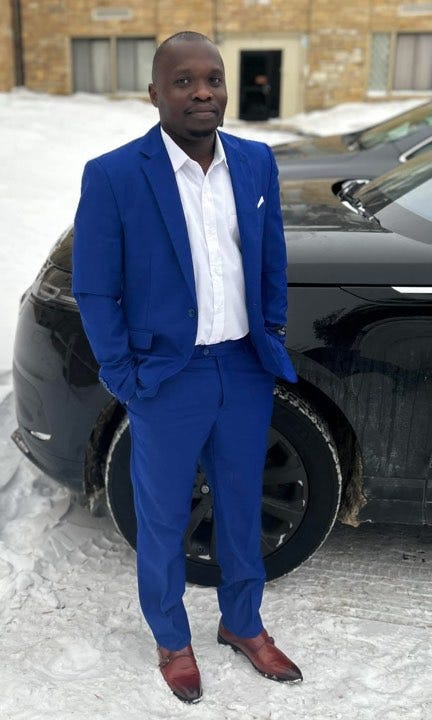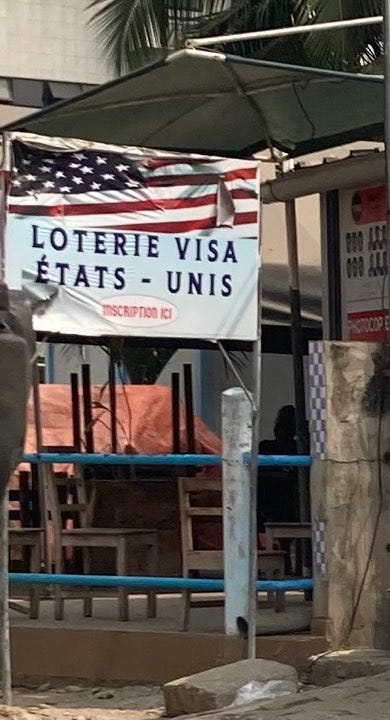An interview with a newcomer to the US
Today 50,000 people will learn they can become Americans. Four years ago Djissa was one of them.
May 3 doesn’t mean much to most Americans. But for about 20 million people around the world, today is the day they’ll learn whether they will become Americans.
That’s the number of people who apply each year for the diversity visa lottery, a little-known immigration program that allows people from countries that send few immigrants to the US to enter into a lottery for a green card (provided they meet a few criteria like having a high school diploma). Not that many people come to the US through diversity visas: only 50,000 people are selected each year, though they can also come with their close family. But the visa lottery is by far the immigration pathway that the most people are eligible for, providing a legal path to the US for people who would otherwise have none, especially Africans. (For more history on the visa lottery, see this piece I wrote a few years ago.)
Immigration is under attack in the US, and opponents of immigration have repeatedly proposed eliminating the diversity visa lottery. In this context, I think it’s worth stripping away the rhetoric and just thinking about what it means for real people.
So, I thought of Djissa. When I was a Peace Corps volunteer in Benin, Djissa was a PE teacher at the school where I taught English. We lost touch, so it was to my great surprise when I was scrolling through Facebook and saw that he had posted a picture of himself in Minnesota! I interviewed him in late 2022 for an article that I didn’t end up publishing. I asked him this week whether I could publish an abridged transcript here, and he graciously accepted.
I think this interview a really valuable and honest look at the promise and challenges of immigration, the quiet sacrifices immigrants make in service of their families and our country, and what the US looks like to people coming from the other side of the world. (And my next Substack will be looking at the big-picture trends showing why this kind of immigration will be so important in the coming decades.) Let’s start with the day in 2021 that changed Djissa’s life.
THB: The moment you learned that your wife had been selected, do you remember that moment? How you felt in that moment?
Djissa: [laughs] I couldn’t tell you. I was so happy. I don’t know how to explain it. That day, what happened first…she was so stressed. We were supposed to go somewhere. We said to each other if we’re not selected, it’s not a problem. The other times we weren’t selected it had really hurt us, because we had believed we were just about to go. So we said we’re going to get out a bit. Because we were so stressed…So we went out, but she said she didn’t feel good and she wanted to go back home. So she went home and I stayed with the kids. Well before the results came out, I went to the internet café. But the guy said he was tired and he was going home [and shut the shop]...So I went home where my wife wasn’t feeling well. When I got back, I tried with my phone, but the website was overloaded because there were so many people trying to check. I tried, and tried. My wife said she was tired and was going to bed. The kids were in bed. So I was in the living room watching TV, trying and trying. Around 10pm I tried it and [laughs] I said “wow, I can’t believe it.” [laughs] “I can’t believe it. I can’t believe it.” I went to get her up and she “it’s not true!” We were so happy. We hugged. We were so happy.
THB: Wow, really that was a joyful day. I see you remember that day exactly.
Djissa: We were so happy. Because, I don’t know, I was a teacher in my country—I could never imagine taking a plane.
A sign advertising the visa lottery in Benin.
THB: What was your house like back then? There was electricity, water, all that?
Djissa: Yeah, where we were had all that. It was two bedrooms and a living room.
THB: So it was cement, with a tin roof—a house like that?
Djissa: Yes, it was cement with a tin roof.
THB: After being selected, there were other steps before going to the US: the medical visit, the embassy visit, your documents, and of course the plane ticket to go to the US, and I know that costs a lot of money. How did you find the money to pay for all that?
Djissa: I don’t remember exactly, but for each kid, the medical visit was more than $300. For us the adults it was $200. We had a bit of savings, but that didn’t quite cover it all. I had a friend too who lent me money, because you have to pay $330 for the visa fees for each person. There was another friend who lent me money for that. Now, for the plane ticket, there was an agency that covered it. Because for all of us it was about $4,000. And you’ve lived in Benin, you know what we make there. So we went to the agency, and they said they’d cover it, but after we got to the US, we’d pay 50% on top. So since we didn’t have the money, we had to accept, and we signed the contract. And once we got to the US and started working, we started paying. Because what we made in Benin was just to survive and save a bit.
THB: Have you finished paying it or is there some left?
Djissa: We haven’t finished yet.
THB: Before coming to the US, what did you think it would be like?
Djissa: I already had some friends who were in the US, and they said it was better than Benin. So I already had it in my head that it was better than back home.
THB: So how’s your daily life? Do you have friends?
Djissa: Daily life in the US, for everyone, it’s just work. I start at 2pm, I finish at 10:30. I go home and my wife should start at 11pm and end at 7. So I go get my wife and drop her off. The next morning we should go to our English classes at 8:30 and get home at 11:30. Then we go home and rest until I go to work at 2. Friends? I don’t have friends here. Except the one who welcomed me [the person who already lived in Minnesota and Djissa moved near], but he doesn’t have time. He has his job. On the weekends, we need to wash clothes, maybe take the kids to the park. Eat dinner, watch some films. Because we know it will start again Monday.
THB: Do you eat Beninese food or American food?
Djissa: It’s Beninese food, I have to be honest…The food from here we’re in the habit of eating is pizza. We go to Domino’s pizza. The kids really like that. They also like ice cream…When the kids go to school they say they ate this, they ate that. As they’re kids they’re adapting easily.
THB: What’s your house like?
Djissa: It’s two rooms and a living room. For someone who just got here it’s good. It’s not too expensive. For just starting here, when we have debts to pay—it’s good. Maybe in time we’ll look for something better.
THB: Between the house you have here and the house you were living in in Benin, which do you prefer?
Djissa: [longest laugh of the whole conversation] Is there a comparison?
THB: [laughs] Look, I get why you’re laughing. But not every American would necessarily understand that. So why are you laughing?
Djissa: I get it, I get it. Where I’m renting here, there’s a fridge. There’s a stove. Everything’s inside. [laughs] Back home I didn’t have a fridge.
THB: You work in a factory. What do you do there?
Djissa: Before it was packing meat into packages. I did the “stuffing.” To be honest it really drained me, but after three months, I moved to using a circular knife to cut meat.
THB: And your wife?
Djissa: “Slicer,” the pepperoni they use for pizza.
THB: If you don’t mind, how much do you make?
Djissa: I started at $20.10, but now I’m at $20.35.
THB: With this salary, of course you make much more than you did in Benin. Do you think you’re rich now, or do people in Benin think you’re rich?
Djissa: [pause] People in Benin think I’m rich. If you take what I make here and you convert it, I can’t say I’m not rich. But here, I’m not rich. I don’t know if you understand.
THB: Explain it to me. I’m not disagreeing, but explain it.
Djissa: Back home I was at about $300 per month. But here I make $600 or $700 per week. Back home I’d be rich and people back home think I’m rich. But here, I’m not rich, because that’s not a lot of money here.
THB: Let’s leave the amount of money to the side, because it’s true that you make more here but things are also more expensive. Let’s forget money and talk about how you live here. What you eat, your house, all that. If we compare what you could buy here, that standard of living, is it a quality of life that only a rich person could buy in Benin?
Djissa: No. No, no, no. Even if you’re a rich person in Benin, you couldn’t have the same quality of life as in the US. It has to be said.
THB: Why?
Djissa: Here it’s different. People take care of the country. It’s true we pay taxes and all that. But people take care of the country. If you’re rich, if you’re poor, you have a good quality of life…Here there isn’t malaria. You go to the hospital, they take care of you first, and after you’ll pay. Here there’s insurance…Even cities back home aren’t clean. There’s pollution. Risk of robberies, risk of theft. Here even if you don’t lock your door and you leave, I don’t think anyone would open it.
THB: Are there Americans who have been racist towards you?
Djissa: So far, no. I don’t think so. Maybe there are some Americans who are racist, but I’ve only met Americans who are nice. I haven’t met anyone who has treated me differently because of the color of my skin.
THB: Overall, are you happy you came to the United States?
Djissa: Yeah I’m happy.
THB: So if there were someone in Benin and they asked you whether to apply for the visa lottery, what would you say to them?
Djissa: I’d tell them to just apply. And if they were ever selected, to come. It’s not easy but it’s one thousand times better than Benin. That’s what I could tell them.
THB: Maybe you know there are some Americans who don’t like immigration. They’d say that America is for Americans, Benin is for Beninese, but here is for Americans and they don’t like immigration. What do you think of that?
Djissa: Can I say something about that? It depends on each person’s beliefs. For us it has been helpful for some of us to be able to leave Benin. But you know one thing? We never shut the door to Africa on anyone. Americans can go there, so why say that we can’t come here and it’s for Americans? I don’t know. I think if there’s the possibility for people to come, let them come. Because we also contribute to the country. We’re here and we work. We aren’t here to depend on the US. We’re here and we work for the US. We work for the development of the US. It’s true we benefit too because sometimes we can send money to our brothers and sister back home to create opportunities…If they let us come, we come and we work here. Those who don’t have that luck, we can send them money and they can create businesses there and contribute to the development of their country while we contribute to development here.
THB: I totally understand what you’re saying, how immigrants work and benefit the US. But even Americans who support immigration, they might say that there are people who have family here or who are doctors or scientists, and they’d say why would we give visas through the visa lottery when someone with their mom here or a doctor can’t get a visa. What do you think of that?
Djissa: For that opinion, I get it. But first, you have to understand that the visa lottery requires a high school diploma. That person has at least a high school diploma so you know already that they’re smart. And those who get the visa lottery don’t just stop at a high school diploma. I did five years of education after my high school diploma. My wife did five years of education after her high school diploma. So we are already credentialed in our country. And those of us here have the opportunity to study more. That means we can study more and have a diploma from here and work. Those who come, the majority, the majority of those who come through the visa lottery will study more here. There are a lot who become nurses. I don’t find it right to say that we should give the visas to those who have their family here or are doctors. I think we can give the opportunity to everyone…I think we can keep the visa lottery, and maybe open another immigration program for those who qualify. We could say we’re only looking for doctors, and those who meet the conditions can come. If that person doesn’t have the chance to win the visa lottery, he can come through the other route. The visa lottery gives a chance to a lot of people.




